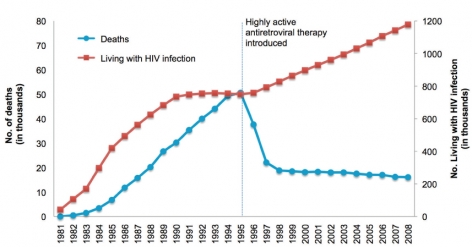How Does Drug Abuse Affect the HIV Epidemic?
Drug abuse and addiction have been inextricably linked with HIV/AIDS since the beginning of the epidemic. While intravenous drug use is well known in this regard, less recognized is the role that drug abuse plays more generally in the spread of HIV by increasing the likelihood of high-risk sex with infected partners.3 The intoxicating effects of many drugs can alter judgment and inhibition and lead people to engage in impulsive and unsafe behaviors. Also, people who are abusing or addicted to drugs may engage in sexually risky behaviors to obtain drugs or money for drugs. Nearly one-quarter of AIDS cases stem from intravenous drug use, and one in four people living with HIV/AIDS in the period of 2005–2009 reported use of alcohol or drugs to an extent that required treatment.4
 *Estimates were obtained by statistically adjusting the national HIV surveillance data reported through June 2010 for reporting delays, but not for incomplete reporting.
*Estimates were obtained by statistically adjusting the national HIV surveillance data reported through June 2010 for reporting delays, but not for incomplete reporting.†HIV prevalence were estimated based on national HIV surveillance data for adults and adolescents (aged ≥13 years at diagnosis) reported through June 2010 using extended back-calculation.
Source: Centers for Disease Control and Prevention
Text Alternative for Graph of Estimated Persons Living with HIV Infection
Drug abuse and addiction can also worsen the progression of HIV and its consequences, especially in the brain. For example, in animal studies, methamphetamine increased the amount of HIV virus present in the brain;5 and in human studies, HIV caused greater neuronal injury and cognitive impairment in methamphetamine abusers compared to non-drug users.6, 7


